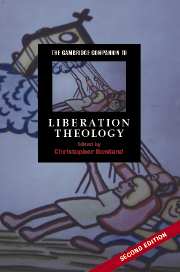Book contents
- Frontmatter
- Introduction: the theology of liberation
- Part I Contemporary Liberation Theology
- 1 The task and content of liberation theology
- 2 ‘Action is the life of all’: the praxis-based epistemology of liberation theology
- 3 Liberation theology in Asia
- 4 Black theology
- 5 Feminist theology: a critical theology of liberation
- 6 Demythologising liberation theology: reflections on power, poverty and sexuality
- Part II Aspects of Liberation Theology
- Part III Analysis and Criticism
- Epilogue: the future of liberation theology
- Select bibliography
- Index
- Series list
4 - Black theology
from Part I - Contemporary Liberation Theology
Published online by Cambridge University Press: 28 January 2008
- Frontmatter
- Introduction: the theology of liberation
- Part I Contemporary Liberation Theology
- 1 The task and content of liberation theology
- 2 ‘Action is the life of all’: the praxis-based epistemology of liberation theology
- 3 Liberation theology in Asia
- 4 Black theology
- 5 Feminist theology: a critical theology of liberation
- 6 Demythologising liberation theology: reflections on power, poverty and sexuality
- Part II Aspects of Liberation Theology
- Part III Analysis and Criticism
- Epilogue: the future of liberation theology
- Select bibliography
- Index
- Series list
Summary
Introduction
There are several ways of approaching Black theology. One approach seeks tocharacterise it in terms of its history, that is, of its origins in the CivilRights and Black Power movements of the 1960s. It maintains that the demands forracial justice embodied in these two movements provided the basis for theemergence of Black theology. I shall not follow this approach here since it is notthe aim of this chapter to offer a detailed description of the relationshipbetween movements of protest and Black theology in the 1960s. This has been doneelsewhere.
The second but related approach starts from an interpretation of the differentways in which African-American slaves appropriated and reworked Christian faith inthe context of their experience of slavery. According to this understanding Blacktheology represents not just a faddish attempt to redefine Christian teaching inthe light of the demands of the social and political forces of the 1960s but acritical search for a historically black Christian form of reflection on issues ofracial justice and liberation. The materials for such reflection come from thetwin realities of slavery in the past and the experience of racism in the present.One important difference between these two approaches is that, although they bothshare the same understanding of Black theology, the first is very much shaped bythe politics of the recent past whereas the second locates its point of departurein the history of slavery itself, with the latter being seen as a historicalexpression of racism.
- Type
- Chapter
- Information
- The Cambridge Companion to Liberation Theology , pp. 79 - 104Publisher: Cambridge University PressPrint publication year: 2007
- 3
- Cited by



